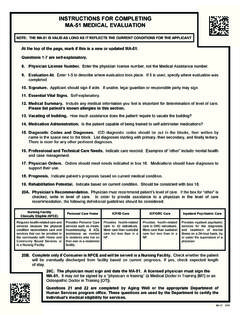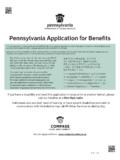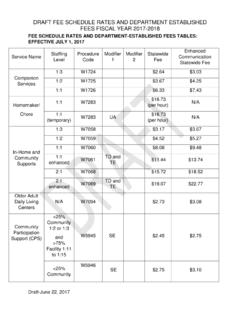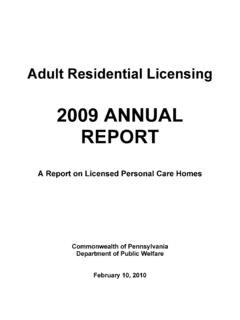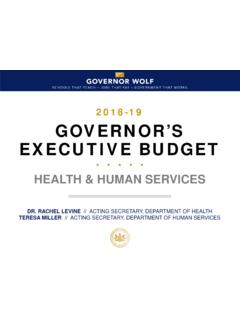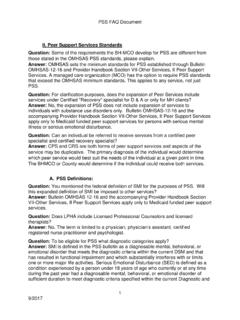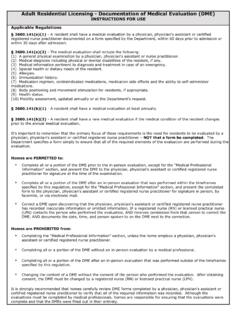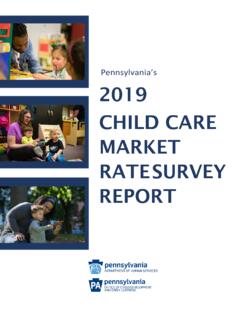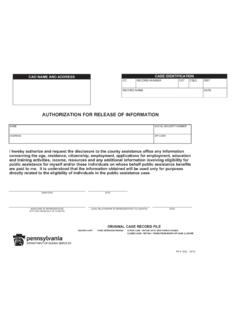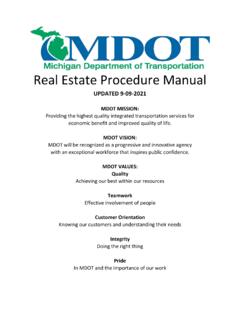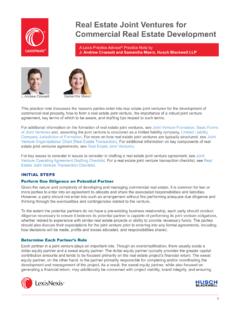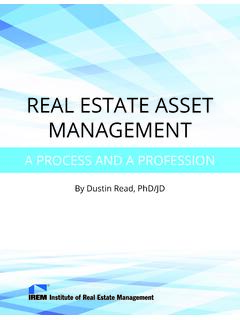Transcription of Estate Recovery Brochure - Department of Human Services
1 Medical Assistance Estate Recovery PROGRAM Questions and Answers2 1. What is the Medical Assistance Estate Recovery Program? Established under federal law, this program requires the Department of Human Services (the Department ) to recover the Medical Assistance (MA) funded costs from the estates of deceased long-term care (LTC) recipients. All monies collected by the Estate Recovery program are returned to the Department s LTC programs to assist others receiving LTC Services . 2. When does Medical Assistance Estate Recovery occur? Estate Recovery happens only after the death of a LTC MA recipient. 3. Who is affected? Only individuals age 55 years and older who received LTC MA-funded benefits for the following Services : Enrolled in Community HealthChoices (CHC); Nursing facility care; Home and community-based Services ; and Any related hospital care and prescription drug Services provided while receiving nursing facility care or care at home or in a community assistance Estate Recovery program3 4.
2 How does Medical Assistance Estate Recovery work? After the death of a LTC MA recipient, the personal representative of the recipient s Estate shall give notice to the Department requesting a statement of claim. A statement of claim is a combination of the amount paid to Community HealthChoices (CHC) and/or the amount of MA-funded nursing facility Services , home and community-based Services and related hospital and prescription drug Services provided from the time the decedent was 55 years of age and thereafter. The notice/letter shall be mailed or faxed, with the deceased s name, deceased s last known address, deceased s Social Security number, deceased s date of birth, deceased s date of death, and written documentation of the gross value of the deceased s Estate to:Division of Third Party Liability Department of Human Services Estate Recovery Program Box 8486 Harrisburg, PA 17105-8486 Fax # (717) 772-6553 Please be sure to include the personal representative s name, address, and telephone number in the notice/letter so the Estate Recovery staff can respond.
3 Within 45 days of receipt of an accurate and complete notice/letter, the Department must send to the personal representative of the Estate , a state-ment of claim listing the amount of LTC MA paid. The Department s claim will be forfeited if a statement of claim is not sent within the 45 day response period. 5. What is an Estate ? An Estate includes property or assets owned entirely or in part by the deceased. Estate Recovery only recovers Estate property or assistance Estate Recovery program4 FREQUENTLY ASKED QUESTIONS 6. Once the Estate is settled, in what order are the proceeds distributed? Proceeds are to be distributed in the following order when there is not enough money to pay all debts: 1. Costs of administration; 2. Family exemption (a single exemption of $3,500 is available to a spouse, child, or parent who resided in the same household of the decedent); 3.
4 Cost of funeral and burial and the cost of any of the following furnished within six months of death: payments to Community HealthChoices (CHC), medicines, nursing Services , medical Services , hospital Services , Services performed by any employees of the deceased; 4. Cost of a grave marker; 5. Rent for any residence occupied by the deceased for six months prior to death; LTC MA-funded Services that occurred prior to the last six months of life; payments to Community HealthChoices (CHC), medicines, nursing Services , medical Services , hospital Services , Services performed by any employees of the deceased; 6. All other Recovery claims fall within numbers 3 and you have questions concerning distribution of the Estate proceeds, talk with an elder law attorney, the local bar association, or your local legal Services office.
5 7. What property is subject to Estate Recovery ? Any property or assets that are part of the deceased s Estate are subject to Estate assistance Estate Recovery program5 Estate Recovery HARDSHIP WAIVER INFORMATION 8. What are the criteria for a hardship waiver? If the gross value of the Estate is $2,400 or less, the Estate is administered, and there is an heir to the Estate , the Department will permanently waive its claim for Estate Recovery . A hardship waiver, with respect to a primary residence of the deceased, will be granted if all the following criteria are met: a) The person has continuously resided in the primary residence of the decedent for at least two years immediately preceding the decedent s receipt of nursing facility Services , or, for at least two years during the period with MA-funded home and community-based Services were received; and b) The person has no other alternative permanent residence; and c) The person has provided care or support to the decedent for at least two years during the period that MA-funded home and community-based Services were received by the decedent, or for at least two years prior to the decedent s receipt of nursing facility Services during which time the decedent needed care or support to remain at home.
6 A hardship waiver will be granted with respect to an income-producing asset (for example, a working farm) for a spouse, child, parent, sibling, or grandchild of the deceased if they meet both of the following criteria: a) The asset is used to generate the primary source of income for the household; and b) There would be a gross family income of less than 250 percent of the federal poverty income guideline* without the asset. *These amounts change every year. For example, in 2018, a single person could earn up to $4,047 per month, while a couple could earn up to $5,487 per assistance Estate Recovery program 9. How do I ask for a hardship waiver? After the death of the recipient, send a letter explaining the situation and the compelling reasons why the Department should not recover against the fair market value of the primary residence.
7 Please provide as many details as possible and make a copy of the letter for yourself. Mail the original letter to: Estate Recovery PROGRAM P. O. Box 8486 Harrisburg, PA 17105-8486 10. Where can I find the hardship waiver form? A hardship waiver form can be obtained by contacting the Estate Recovery program at the above address or by calling 1-800-528-3708. Information is also available on the Estate Recovery program website at CONCERNING REAL PROPERTY 11. What if there is more than one name on the deed? If the deed states tenancy by the entireties or joint tenancy with the right of survivorship, the property will be excluded from Estate Recovery . If the deed does not state tenancy by the entireties or joint tenancy with the right of survivorship, the property may be subject to Estate Recovery . 12. What if we were married but my name is not on the deed?
8 If the deed is only in your spouse s name, you do not legally own the home. If your spouse received LTC MA-funded Services , Estate Recovery will delay Recovery until you vacate, sell the property, or after your death. 13. We were never marred but lived together. Do Estate Recovery regulations still apply? Yes. If you have questions, talk with an elder law attorney. medical assistance Estate Recovery program67 14. How do I qualify for a delayed Recovery ? Estate Recovery will be delayed if the spouse of a dependent child is still alive after the death of the LTC MA recipient. Estate Recovery will be delayed until all of the applicable events have occurred: the death of the spouse, death of a child who is blind or totally and permanently disabled, or dependent child reaches age 21. 15. Will I have to turn my home over to the Department when I move to a nursing facility or begin receiving home and community-based Services ?
9 No. You do not have to sign over the deed to your home to receive LTC MA-funded Services . 16. What happens if someone has been paying taxes and upkeep expenses for maintaining the deceased s vacant home? An amount equal to the necessary and reasonable expenses for maintaining the vacant home will be deducted from the amount due to Estate Recovery . Necessary and reasonable expenses include real Estate taxes, utility bills, home repairs, and home PROPERTY 17. Can I give my home away before I enter the nursing facility or receive home and community-based Services ? If you have questions about how transferring property may affect your eligi-bility for LTC MA-funded Services , contact your local county assistance office or the DHS Helpline at assistance Estate Recovery program8 18. I am not sure who owns the home because it was passed down by family members.
10 Can I still give the home to my children who have been taking care of me? If your childrens names are not on the deed, they do not legally own the home and it may be subject to Estate Recovery . 19. What if I have a sudden increase in assets (sale of home, inheritance, lottery winnings, etc.) and do not want to lose my LTC MA eligibility? In cases where you have a sudden increase in assets, you may request to Pre-Pay Prior to Death (PPPD). A PPPD allows you to pay up to the amount the Department has already paid in LTC MA-funded Services on your behalf. A PPPD allows you to keep your LTC MA eligibility. Funds repaid are reduced from the Department s future Estate Recovery claim. If you are interested in requesting a PPPD, contact your local county assistance office for more assistance Estate Recovery program9medical assistance Estate Recovery programWHAT IF I HAVE MORE QUESTIONS?
